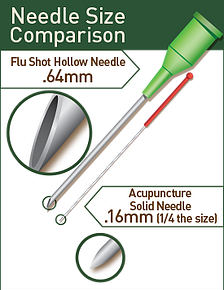Faqs
What is acupuncture?
Acupuncture is one of the modalities of Oriental medicine. Although what is called acupuncture in the West comprises several different therapies (such as moxibustion and cupping), mostly it consists of the insertion of fine needles into the body at specific points shown to be effective in the treatment of specific health problems. These points have been mapped by the Chinese over a period of two thousand years, and there are more than a thousand known acupoints. In the past three decades, electromagnetic research has confirmed the existence and location of these points.
What can acupuncture treat?
The World Health Organization recognizes acupuncture’s effectiveness for over 40 common disorders, such as:
- Ear, Nose & Throat Disorders — toothaches, earaches, sinusitis, rhinitis, laryngitis…
- Respiratory Disorders — colds & flus, bronchitis, asthma, allergies, emphysema…
- Gastrointestinal Disorders — food allergies, nausea, indigestion, diarrhea, constipation, ulcers, colitis…
- Circulatory Disorders — hypertension, high cholesterol, arteriosclerosis, angina pectoris…
- Urogenital Disorders — cystitis, stress incontinence, neurogenic bladder, prostatitis, prostatic hypertrophy
- Gynecological Disorders — menstrual irregularity, endometriosis, PMS, infertility, menopausal syndrome
- Musculoskeletal Disorders — tennis elbow, frozen shoulder, TMJ, sciatica, low back pain, arthritis, carpal tunnel syndrome, fibromyalgia…
- Neurological Disorders — depression, anxiety, insomnia, headache, migraine, trigeminal neuralgia, intercostal neuralgia, post-stroke paralysis…
How does acupuncture work?
Modern Western medicine cannot yet explain how acupuncture works. Traditional Asian acupuncture is based on ancient Chinese theories of the flow of qi (a fine, essential substance which nourishes and constructs the body) through distinct channels that cover the body somewhat like the nerves and blood vessels. According to this theory, acupuncture adjusts the flow of qi in the body, leading to areas where it is insufficient and draining it from areas where it is stuck and/or superabundant. In this way, acupuncture restores the harmonious balance of the body and its parts. In Chinese, there is a saying, “if there is pain, there is no free flow; if there is free flow, there is no pain.” Acupuncture promotes and reestablishes the free flow of qi.
Is acupuncture safe?
When performed by a completely trained, licensed professional, acupuncture is extremely safe. All licensed acupuncturist today use individually packages sterile, disposable needles. So there is virtually no chance of infection or contagion.
Does acupuncture hurt?
Acupuncture needles are typically not much thicker than a strand of hair, and their insertion is practically painless. It is nothing like receiving an ordinary injection. In some cases, you will not even know the needles are in place. In others, there may be some tingling, warmth, heaviness, or a feeling of the qi moving up and down the pathways. Most people find acupuncture extremely relaxing, and many fall asleep during the treatment.
Here is an illustration showcasing how thin an acupuncture needle is in relation to a medical syringe:

How many treatments will I need?
That depends on the duration, severity, and nature of your complaint. You may need only a single treatment for an acute condition. A series of 5-10 treatments may resolve many chronic problems. Some degenerative conditions may require many treatments over a period of time. To help reduce the number of treatments, your acupuncturist may suggest dietary modifications, specific exercise regimes, relaxation techniques, self-massage, and/or Chinese herbal medicines, all of which may help increase the efficacy of acupuncture.
Do you take insurance?
Yes! We accept most types of insurance. We are in network with ( ). Depending on your insurance plan, the amount of coverage varies widely. Please be advised when your insurance company gives you coverage details for acupuncture coverage, these are just estimates. Your actual coverage may differ from the estimated amount.
Please note that insurance billing rates vary according to the length of treatment, the modalities used, and the complexity and severity of your condition. We will be glad to discuss this in more detail with you.
What is your cancellation policy?
All scheduled appointments must be cancelled at least 24 hours before the appointment time without incurring a $50 cancellation fee. Some exceptions apply.
